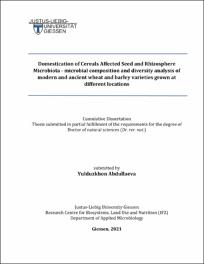| dc.description.abstract | Ever since crop plants were first domesticated, they have undergone enormous genetic changes. The effect of this domestication on the plant microbiome has recently started to be intensively studied with the invention of the “omics” techniques. The effect of domestication on the diversity, assembly, function, inter/intra-kingdom network analysis of root-associated microorganisms is yet to be studied. The ultimate goal of the thesis was to explore how plant domestication affected the root-associated microbiome structure, diversity, co-occurrence and co-evolution of seeds, root endophytes, and the rhizosphere microbiome. Different wheat and barley varieties were chosen as model crop plants in this study because of their long domestication history, nutritional value, and economic importance.
In the first phase of the study, the impact of domestication on the assembly, diversity, and microbial network of seed endophytes of wild and domesticated wheat and barley species was investigated. Subsequently, the phylogenetic resemblance between cereals and their spermosphere as an indication for co-evolution between plants and microbes was examined. The main finding of this study was higher microbial diversity which was found in modern wheat species compared to their corresponding wild progenitors. In contrast, more microbe-microbe interactions were observed in wild species. Furthermore, Cutibacterium, known as a human-associated bacteria genus, was found enriched in cultivated cereals as compared to wild cereals. A strong phylogenetic congruence between seed endophytes and host plants was discovered through co-evolutionary analysis.
In the second phase, the effect of plant domestication on the microbial abundance, diversity, microbial network, and the assembly process of endorhiza and rhizosphere microbiome of two couples of genetically connected wheat species (wild diploid Aegilops tauschii vs modern hexaploid Triticum aestivum; wild tetraploid T. dicoccoides vs modern tetraploid T. durum) were studied in different environments. For this purpose, a field study was conducted in three locations (experimental farms of Justus Liebig University: Groß-Gerau, Weilburger Grenze, and Rauischholzhausen) in Hessen, Germany. The distinct habitat microbiomes were evaluated using the 16S rRNA gene and fungal ITS2 amplicon sequencing. First, the effect of domestication on the seed-transmitted microbiome to endorhiza and rhizosphere was demonstrated by comparing the proportion of seed ASVs (Amplicon sequence variants) that transmitted to endorhiza and rhizosphere microbiomes at three locations. The relative proportion of seed-transmitted microbiome was higher, as well as more diverse in the endorhiza and rhizosphere of diploid A. tauschii compared to other tetraploid and hexaploid wheat species. Furthermore, a significant location effect on the relative proportion of fungal seed-transmitted microbiome than bacteria was found.
Second, the comparison of differently abundant species revealed that more bacterial genera were differently enriched in the rhizosphere of A. tauschii than the other wheat species that were grown in the same site. The differential abundance test showed that the rhizosphere of genetically related couples of wheat species was found enriched with similar bacterial and fungal genera from the bulk soil however, the composition of these enriched microbiomes was different between locations.
The difference in the beta-diversity of bacterial and fungal microbiota between wild and domesticated wheat species was found only in the root endosphere but not in the rhizosphere. However, differential abundance analysis of the rhizosphere microbiome revealed a compositional shift in the rhizosphere of modern wheat species. Furthermore, different domestication effect was observed between two couples of genetically connected wheat species; more drastic changes were found between modern hexaploid T. aestivum and its diploid D genome donor diploid A. tauschii compared to the other couple. In both modern wheat rhizosphere, the bacterial microbiome was found enriched. As well as the abundance of the fungal microbiome was increased however their diversity was reduced, particularly pathogenic fungi, compared to their wild relatives. Furthermore, less cross-kingdom connectedness was found in the rhizosphere of modern species compared to their ancestors. Besides, the abundance of bacterial genes responsible for the production of proteins involved in nutrient cycling was reduced in the modern wheat species compared to their wild relatives. The correlation of rhizosphere microbiome with functional gene indicated the key microbial species in natural habitats that play a pivotal role in microbial interactions.
By investigating the microbiome of wild plants, we provide insights into the influence of domestication on spermosphere/root endosphere/rhizosphere microbiome composition and function, and this knowledge can be utilized to restore beneficial associations in current cultivars. | de_DE |



